浙江省理工大学考博英语真题
(请考生在答题纸或答题卡上答题,在试题纸上答题无效)
B. requisite
C. desperate
D. impatient
B. to reprove
C. to mistake
Part I Vocabulary (20 marks, 1 mark each)
Section A
Directions: Inthissectionthereare10incompletesentencesinthissection.Foreach
sentencetherearefourchoicesmarkedA,B,CandD.Choosetheonethatbestcompletes
thesentence.ThenmarkthecorrespondingletteronAnswerSheetIwithasingleline
through the center.
1. If you never do any work, you will only have yourself ____ if you fail your examination.
A. to fault
2. I’d like to study under your guidance, because I know you are a(n) ____ scientist
in physics.
A. prominent
3. Before their skins were used, their feet were ____, leading to the misconception
that the birds never had feet.
A. cut down
4. With the constant change of the conditions, the outcome is not always _____.
A. favorable
5. The television station is supported by ______ from foundations and other sources.
A. pensions B. accounts C. donations D. advertisements
6. We’ll all take a vacation in the mountains as soon as I finish working _____ my
project.
A. with
7. Her husband is interested in designing electronic _________.
D. devices
A. safety
8. Gestures are an important means to _______ message.
A. study
9. ________ preparations were being made for the Prime Minister's official visit to
the four foreign countries.
A. Elaborate
10. ____ adults, young children find little difficulty in imitating sounds in foreign
languages.
A. Not like
D. predictable
C. dependable
B. Wise
C. Neutral
C. cut over
D. cut off
B. management
C. routine
B. reasonable
C. in
D. about
C. Being not
B. convey
C. keep
D. exploit
B. Unlike
D. Not as
B. cut into
B. on
D. to blame
D. Optional
Section B
Directions: In this section there are 10 sentences, each with one word or phrases
underlined.Choose theone from thefour choicesmarkedA, B, C and Dthat best keeps
the meaning of the sentence. Then mark the corresponding letter on the Answer Sheet
I with a single line through the center.
11. The financial pressure will bring about enormous psychological discomfort.
A. dense
B. distinct
C. doubtful
D. great
12. It is the unique satisfaction they can derive from the work they accomplished.
A. inherit
B. obtain
C. ignore
D. accompany
13. The managers are working hard to transform their entire organizations.
�
A. found
B. rank
C. reform
D. destroy
14. The most terrible disputes are those about matters as to which there is no good
evidence.
A. agreements
B. discussions
C. conversations
D. arguments
15. You should be cautious about what you are going to say.
A. polite
B. prevailing
C. internal
D. careful
16. They consulted their tutor about this difficult issue and got what they needed.
D. made up of
B. got benefit from
A. asked advice of
C. kept an eye on
17. It is necessary to contrast China’s education system with in USA.
D. celebrate
A. overcome
B. compare
C. admit
18. He mentioned that kind of happiness which most people have lived through.
A. concealed
B. proposed
C. complained
D. experienced
19. It must be clear that these problems must be tackled before Friday.
A. existed
B. solved
C. remembered
D. assumed
20. My friend unexpectedly dropped in, and I had no time to entertain them.
A. visited
B. stepped in
C. dropped off
D. met
Part II Cloze Test (20 marks, 1 mark each)
Directions: Thereare20blanksinthefollowingpassage.Foreachblanktherearefour
choicesmarkedA,B,CandD.Youshouldchoosetheonethatbestfitsintothepassage.
Then mark the corresponding letter on the Answer Sheet I with a single line through
the center.
During the early years of this century, wheat was seen as the very lifeblood of
was good; when the crops failed,
the yields and the price of wheat with
of wheat became an increasingly
as if they were growers. The 26
23 . People on city streets 24
the crops were good, the
22
Western Canada. 21
there was
almost as much 25
27
topic of conversation.
War set the stage for the most
29
30
33
31
28
were generally low in the autumn,
events in marketing the western crop. For years
speculative (投机的) grain selling as carried on through the Winnipeg
farmers could not
they sold their wheat soon
were coming due only to see prices rising and speculators
35 , producer groups asked for firmer controls, but governments
wartime when wheat prices threatened to
farmers
grain Exchange. Wheat
wait for markets to improve. It had happened too often
after harvest when farm
34 rich. On various
had no wish to become involved, at least
run wild.
Anxious to check inflation and rising living cost, the federal government appointed
a 37
of grain supervisors to handle deliveries from the crops of 1917 and 1918. Grain
Exchange trading was
by the board. To handle the
crop of 1919, the government
the first Canadian Wheat Board, with full authority
to buy, sell, and set prices.
38 , and farmers sold at prices
32
39
36
40
21. A If
22. A. economist
23. A. depression
24. A. looked
25. A. thought
B. Since
B. economical
B. deprivation
C. When
C. economics
C. description
D. But
D. economy
D. depletion
B. watched
B. feeling
C. saw
C. idea
D. noticed
D. mind
�
B. purchasing
B. favourite
B. mistook
B. worth
B. what
B. savings
B. getting
B. situations
B. because
B. amusing
26. A. growing
27. A. favourable
28. A. dramatic
29. A. misunderstood
30. A. values
31. A. so
32. A. which
33. A. debts
34. A. being
35. A. conditions
36. A. when
37. A. board
38. A. suspended
39. A. setting
40. A. disappointed B. assigned
B. fixed
B. because
B. group
B. sustained
C. keeping
D. marketing
C. favour
D. frequent
C. dreadful
C. mistrusted
C. prices
D. interesting
D. misjudged
D. sales
C. and
D. but
C. that
C. taxes
C. became
D. because
D. duties
D. grew
C. occasions
D. positions
C. if
C. committee
C. suspected
C. deciding
D. not until
D. organization
D. delayed
D. determining
C. entrusted
D. appointed
Part III Reading Comprehension (25 marks, 1 mark each)
Directions: Thereare5passagesinthispart.Eachpassageisfollowedbysomequestions
or unfinished statements. For each of them there are four choices marked A, B, C and
D. You should decide on the best choice and mark the corresponding letter on Answer
Sheet I with a single line through the center.
Passage 1
There are two methods of fighting, the one by law, the other by force; the first
method is that of men, the second of beasts; but as the first method is often insufficient,
one must have recourse to the second. It is, therefore, necessary for a prince to know
how to use both the beast and the man. This was covertly taught to the rules by ancient
writers, who relate how Achilles and many others of those ancient princes were given
Chiron the centaur to be brought up and educated under his discipline. The parable of
this semi-animal, semi-human teacher is meant to indicate that a prince must know how
to use both natures, and that the one without the other is not durable.
A prince, being thus obliged to know well how to act as a beast, must imitate the
fox, and the lion, for the lion cannot protect himself from traps, and the fox can not
defend himself from wolves. Those that wish to be only lions do not understand this.
Therefore, a prudent ruler ought not to keep faith when by doing so it would be against
his interest, and the reasons which made him bind himself no longer exist. If men were
all good, this precept would not be a good one; but as they are bad, and would not observe
their faith with you, so you are not bound to keep faith with them. Nor have legitimate
grounds ever failed a prince who wished to show colorable excuse for the nonfulfilment
of his promise. Of this one could furnish an infinite number of examples, and show how
many times peace has been broken, and how many promises rendered worthless, by the
faithlessness of princes, and those that have best been able to imitate the fox have
succeeded best. But it is necessary to be able to disguise this character well, and
to be a great feigner and dissembler, and men are so simple and so ready to obey present
necessities, that the one who deceives will always find those who allow themselves to
be deceived.
�
41. The writer does not believe that _________.
a. the truth makes men free
c. princes are human
b. people can protect themselves
d. leaders have to be consistent
42. “Prince” in the passage designates __________.
a. anyone in power
c. aristocrats
b. elected officials
d. sons of kings
43. The lion represents those who are __________.
a. too trusting
c. strong and powerful
b. reliant on force
d. lacking in intelligence
44. The fox, in the passage, is ____________.
a. admired for his trickery
c. pitied for his wiles
b. no match for the lion
d. considered worthless
45. The writer suggests that a successful leader must _______.
a. be prudent and faithful
c. have principle to guide his actions
b. cheat and lie
d. follow the truth
Passage 2
The ballad and the folk song have long been recognized as important keys to the
thoughts and feelings of a people, but the dime novel, though sought by the collector
and referred to in a general way by the social historian, is dismissed with a smile
amusement by almost everyone else. Neither folk songs nor dime novels were actually
created by the plain people of America. But in their devotion to these models of
expression, the people made them their own. The dime novel, intended as it was for the
great masses and designed to fill the pockets of both author and publisher, quite
naturally sought the lowest common denominator: themes that were found to be popular
and attitudes that met with the most general approval became stereotyped. Moreover,
the dime novel, reflecting a much wider range of attitudes and ideas than the ballad
and the folk song, is the nearest thing we have had in this country to a true
“proletarian” literature, that is, a literature written for the great masses of people
and actually read by them.
Although a study of our dime novels alone cannot enable anyone to determine what
are the essential characteristics of the American tradition, it can contribute
materially to that end. Sooner or later, the industrious researchers who have mined
so many obscure lodes of American literary expression will almost certainly turn their
attention to these novels and all their kind. Let no one think, however, that the
salmon-covered paperbacks once so eagerly devoured by soldiers, lumberjacks, trainmen,
hired girls, and adolescent boys now make exciting or agreeable reading even for the
historian, much as the social and historical implications may interest him. As for the
crowds today who get their sensational thrills from the movies and the tabloids, I fear
that they would find these hair-raisers of an earlier age deadly dull.
46. The principal intention of the author of a dime novel was to __________.
a. explore a segment of American society.
b. promote the American political philosophy.
c. raise the level of intelligence of the great masses of people.
d. make money.
47. The “lowest common denominator” refers to _________.
�
a. the poorer classes.
b. themes and attitudes that would be accepted by the greatest number of people.
c. attitudes accepted by the American intellectuals.
d. the character of the authors of the dime novel.
48. “Proletarian” literature is _________.
a. written for and read by the great masses of people.
b. distinguished by its devotion to pornography.
c. distinguished by its elegant style.
d. written for, but not actually read by, most people.
49. The author believes that a study of our dime novels __________.
a. is a waste of time.
b. would be sufficient in itself to determine the essential characteristics of the
American tradition.
c. would be a valuable contribution in determining the essential characteristics
of the American tradition.
d. would be amusing but unimportant.
50. Which of the following is implied in the passage?
a. The attitudes of the masses of people are best expressed by sociology texts.
b. The nearest thing we have had to a proletarian literature is the dime novel.
c. The study of the formal literature alone will not enable the historian to
understand the attitudes and interests of the common people.
d. Because the themes in the dime novels were not good, they could no longer be legally
distributed.
Passage 3
When we say somebody touches us emotionally, it means he or she has gone to the
core of our being. Physical touch, too, is more than skin-deep. Skin is the human body’
s largest organ, containing millions of receptors --- about 8,000 in a single fingertip
--- that send messages through nerve fibers to the spinal cord and then to the brain.
A simple touch --- a hand on a shoulder, an arm around a waist --- can reduce the heart
rates and lower blood pressure. Even people in deep comas may show changes in their
heart rates when their hands are held. Positive, nurturing touch appears to stimulate
the release of endorphins, the body’s natural pain suppressors. That may explain why
a mother’s hug can literally “make it better” when a child skins his knee.
According to TRI research, message boosts immune function --- even in HIV positive
patients --- and lower levels of stress hormones cortical and nor epinephrine.
Also, massaged preemies were discharged from the hospital six days sooner on average.
With hundreds of thousands of premature births each year, one might think hospital
nurseries would be falling all over themselves to establish massage programs. Yet they
are still not widespread.
Perhaps one reason is cultural. Some countries are more tactile than others. When
psychologist Sidney Jourard observed rates of causal touch among couples in cafes around
the world, he reported the highest rate in Puerto Rico (180 times per hours). Field
found that French adolescents demonstrate significantly more casual touching ---
learning on a friend, putting an arm around another’s shoulder. “American teenagers
were more likely to fiddle with their rings, crack their knuckles or engage in other
�
forms of self-stimulation. French parents and teachers are more physically affectionate,
and the kids are less aggressive,” says Field.
First and last: touch is the first sense to develop in humans, and it may be the last
to fade. TRI set up a study in which volunteers over age 60 were given three weeks of
massage and then were trained to massage toddlers at the preschool. Giving massage proved
even more beneficial than getting them: The elders exhibited less depression and
loneliness and lower levels of stress hormones. They had fewer doctor visits, drank
less coffee and made more social phone calls.
51.When we say somebody touches us emotionally, it means ____________
A. he or she has known what we are thinking about
B. we have got in touch with him or her
C. he or she has moved us
D. he or she can understand us
52. A positive touch may ________
A. make a patient recover
C. make a child skin his knee
B. relieve the pain
D. stimulate a patient
53. Preemies were discharged from hospital _________
A. six days sooner on average
B. when they were in good health
C. after they had stayed in hospital for six days on average
D. sooner than the others if they had been massaged
54. Why are French children less aggressive than their American counterparts?
A. Because French parents and children touch each other more frequently.
B. Because American kids are more likely to fiddle with their rings.
C. Because French kids are less aggressive by nature.
D. Because American kids like self-stimulation.
55. The study with volunteers over 60 proved that physical touch ________
A. may do good to both who touches the others and who are touched
B. may be more beneficial to the one who are touched
C. may be more beneficial to elders.
D. may be more beneficial to babies
Passage Four
A few years ago a young mother watched her husband diaper their firstborn son. “You
do not have to be unhappy about it,” she protested. “You can talk to him and smile
a little.” The father, who happened to be a psychologist, answered firmly, “He has
nothing to say to me, and I have nothing to say to him.”
Psychologist now know how wrong that father was. From the moment of birth, a baby
has a great deal to say to his parent and they to him. But a decade or so ago, these
experts were describing the newborn as a primitive creature who reacted only by reflex,
a helpless victim of its environment without capacity to influence it. And mothers
accepted the truth. Most thought (and some still do) that a new infant could see only
blurry shadows, that his other senses were undeveloped, and that all he required was
nourishment, clean diapers, and a warm bassinet.
Today university laboratories across the country are studying newborns in their
first month of life. As a result, psychologists now describe the new baby as perceptive,
�
with remarkable learning abilities and an even more remarkable capacity to shape his
or her environment including the attitudes and actions of his parents. Some researchers
believe that the neonatal period may even be the most significant four weeks in an entire
lifetime.
Far from being helpless, the newborn knows what he likes and rejects what he doesn’
t. He shut out unpleasant sensations by closing his eyes or averting his face. He is
a glutton for novelty. He prefers animate things over inanimate and likes people more
than anything.
When a more nine minutes out, an infant prefers a human face to a head-shaped outline.
He makes the choice despite the fact that, with delivery room attendants masked and
gowned, he has never seen a human face before. By the time he’s twelve hours old, his
entire body moves in precise synchrony to the sound of a human voice, as if he were
dancing. A non-human sound, such as a tapping noise, brings no such response.
56. The author points out that the father diapering his first-born son was wrong because
_______.
A. he thought the baby was not capable of any response
B. he thought the baby didn’t have the power of speech
C. he was a psychologist unworthy of his profession
D. he believed the baby was not able to hear him
57. According to the passage, which of the following is TRUE?
A. A new infant can see only blurry shadows.
B. A new infant is actually able to influence his or her environment.
C. All a new infant requires is nourishment, clean diapers, and a warm bassinet.
D. A new infant’s senses are undeveloped.
58. What does the sentence “He is a glutton for novelty” probably mean?
A. The newborn is greedy for new food.
B. The newborn tends to overeat.
C. The newborn always loves things that are new to him.
D. The newborn’s appetite is a constant topic in novels.
59. According to the passage, it’s groundless to think that newborns prefer ________.
A. a human face to a head-shaped outline
B. animate things to inanimate ones
C. human voice to non-human sounds
D. nourishment to a warm bassinet
60. What is the passage mainly discussing about?
A. Why the first month of life is the most significant four weeks in a lifetime.
B. How wrong parents are when they handle their babies.
C. How much newborns have progressed in about a decade’s time.
D. What people know about newborns.
Passage Five
The interview is an important event in the job-hunting process, because the 20 or
30 minutes you spend with the interviewer may determine whether or not you get the
particular job you want. Therefore ,it is important to remember that your objective
during the interview may differ from the objective of the potential employer. You want
to make yourself stand out as a whole person who has personal strengths, is well qualified,
�
and should be considered the right person for the job. It is encouraging to know that
the interview’s task is not to embarrass you or to trip you up, but to hire the right
person for the job.
Remember, job hunting is very competitive. Anything you can do to enhance your
interview techniques will be to your advantage. The following suggestions may help you
land the most important job.
Your goal in this interview is to make sure your good points get across. The
interviewer won’t know them unless you point them out, so try to do this in a factual
and sincere manner.
Do not make slighting references to former employers or professors. If you have
been fired from a job and the interviewer asks about it, be frank in your answer.
Show the interviewer that you are interested in the company by asking relevant
questions. Ask about responsibilities, working conditions, promotion opportunities and
fringe benefits of the job you are interviewing for.
If at some point you decide the interview is not going well, do not let your
discouragement show. You have nothing to lose by continuing a show of confidence, and
you may have much to gain. It may be real, or it may be a test to see how you react
to adverse conditions.
Some interviewers may bring up salary early in the interview. At this time, you
may indicate that you are more interested in a job where you can prove yourself than
a specific salary. This politely passes the question back to the interviewer. If possible,
you should negotiate for salary after you have been offered a job and when you are ready
to complete the paperwork.
61. To get the job you want, during the interview you should ________.
A. avoid the interviewer’s questions that are designed to trip you up
B. remember that you are the best qualified candidate
C. keep in mind that it determines whether or not you get the particular job you
want
D. make yourself stand out as the right person for the job
62. If you did not get along with your former employer, you _______.
A. should tell the interviewer frankly
B. should refer to him in a factual manner
C. should not speak ill of him
D. should never mention it
63. When you find the interview is not going well you should ________.
A. bring it to an end as soon as possible
B. keep up your confidence
C. tell you interviewer how you react to adverse conditions
D. tell yourself you have much to gain and nothing to lose
64. The best time to discuss your salary is________.
A. when the interviewer brings this matter up
B. at the end of the interview
C. after you have completed the paperwork
D. keep up your confidence
65. The most important thing to do during an interview is________.
A. to make your strengths understood
�
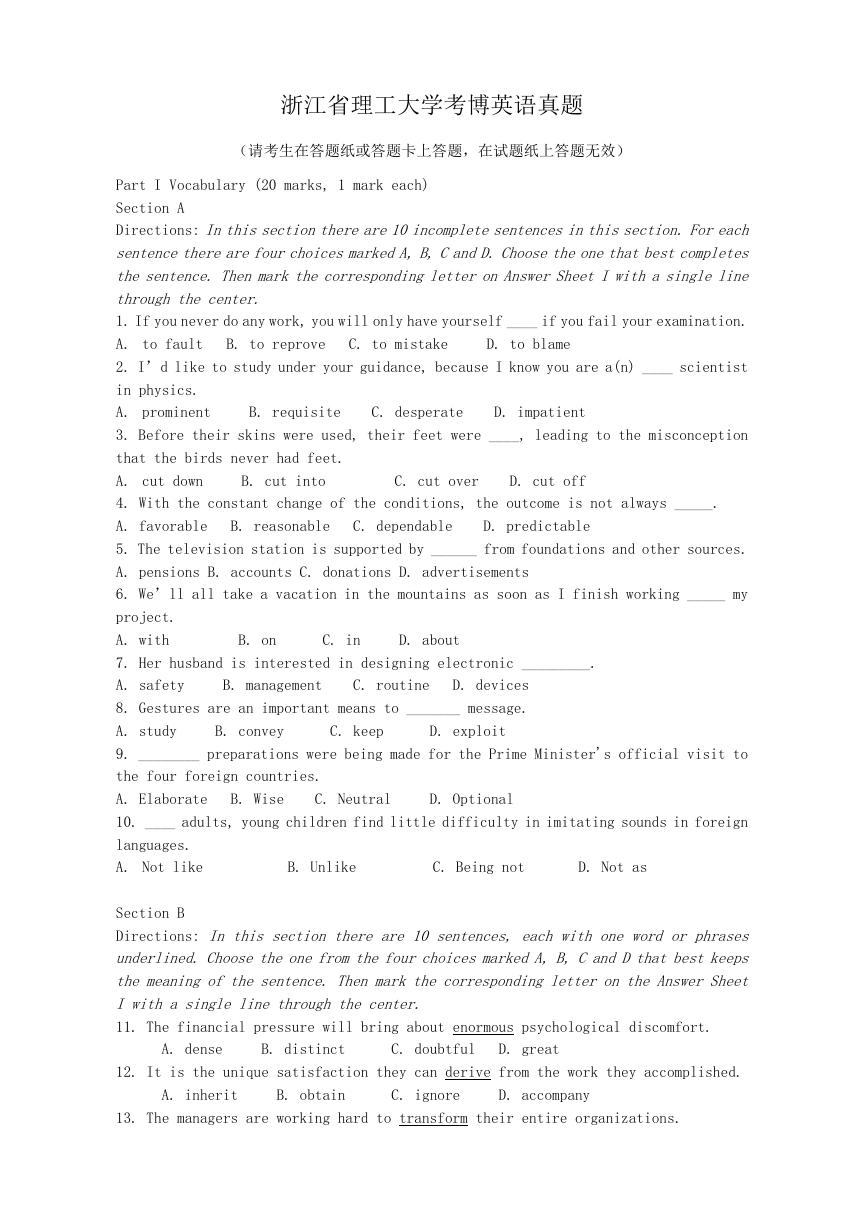
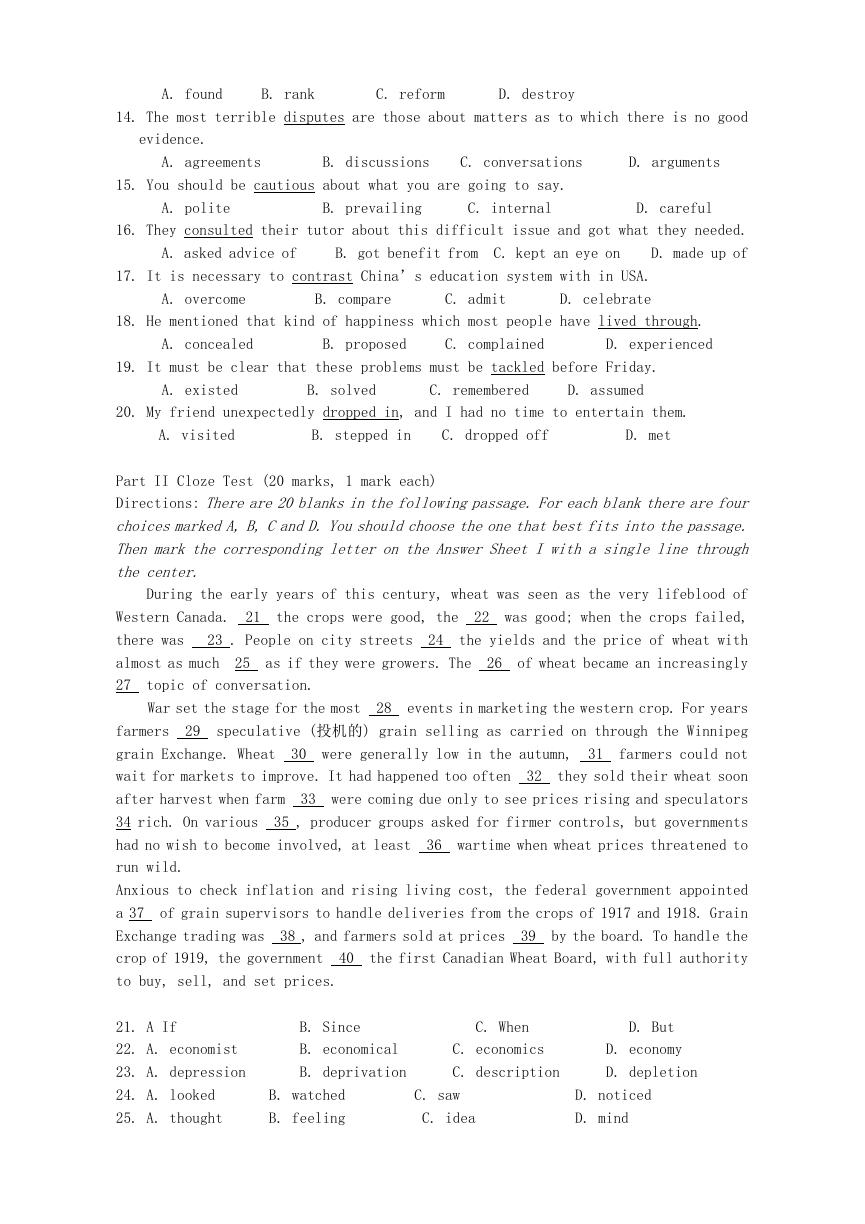
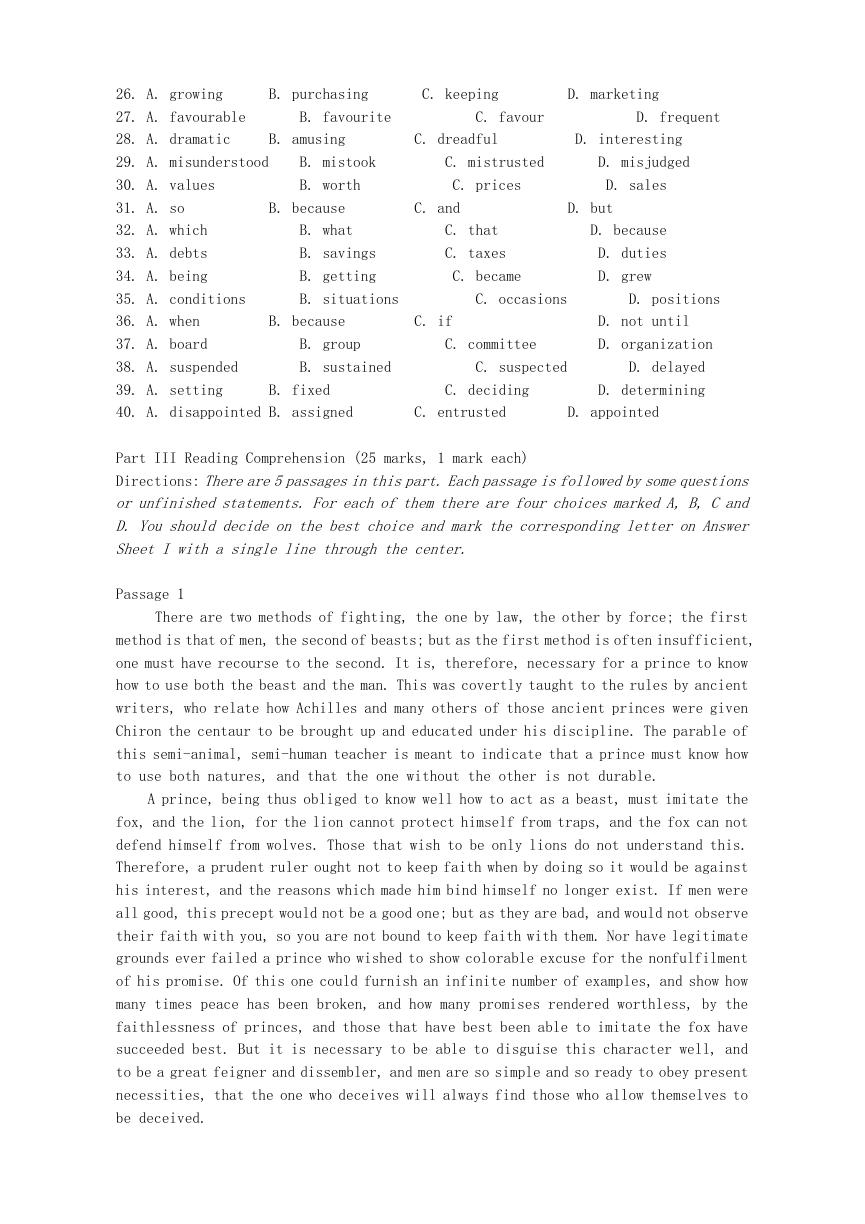
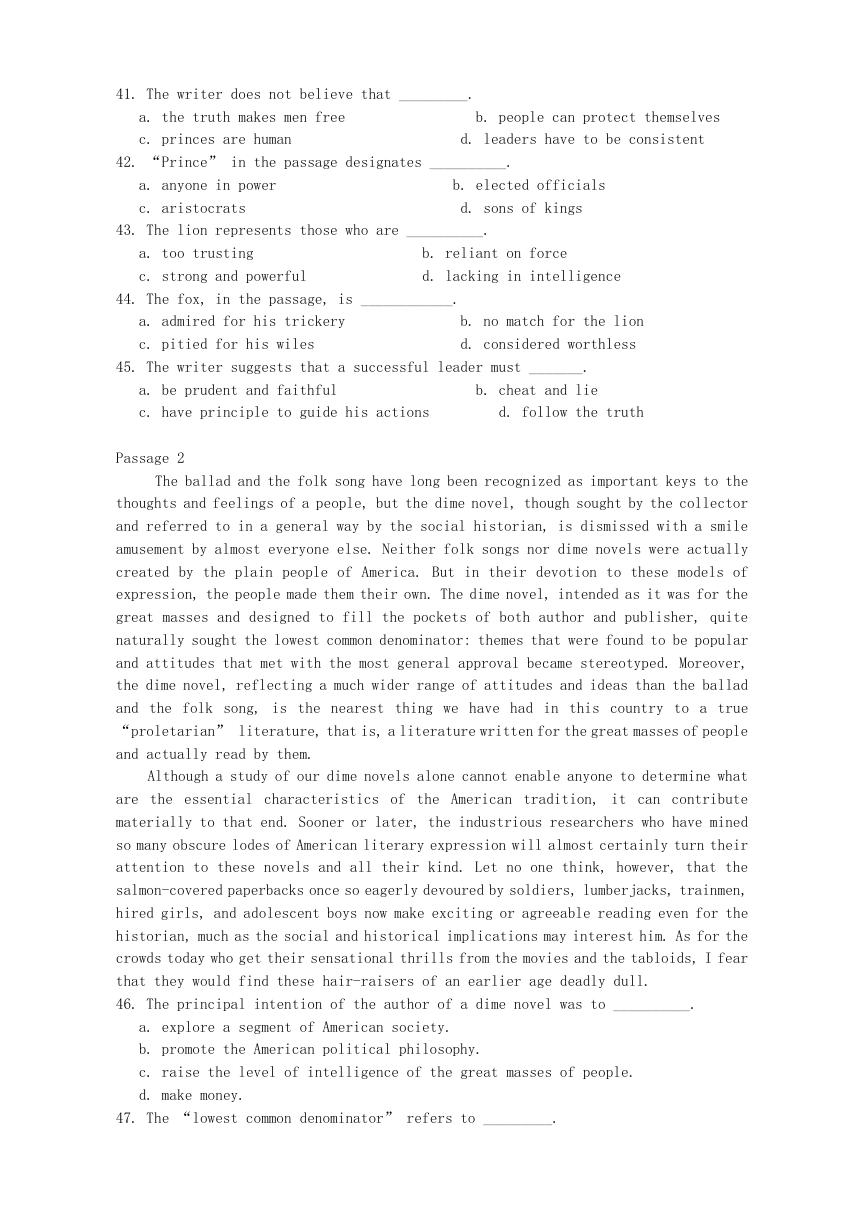
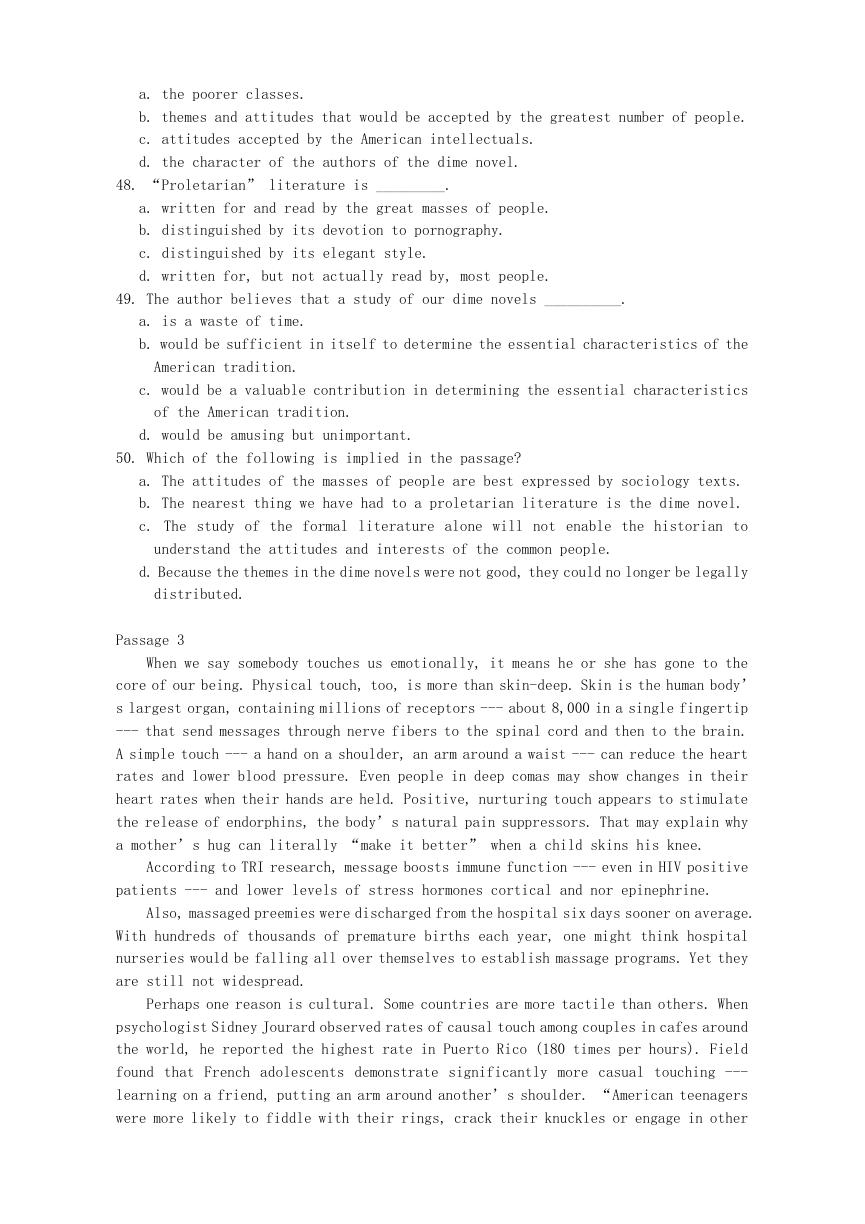
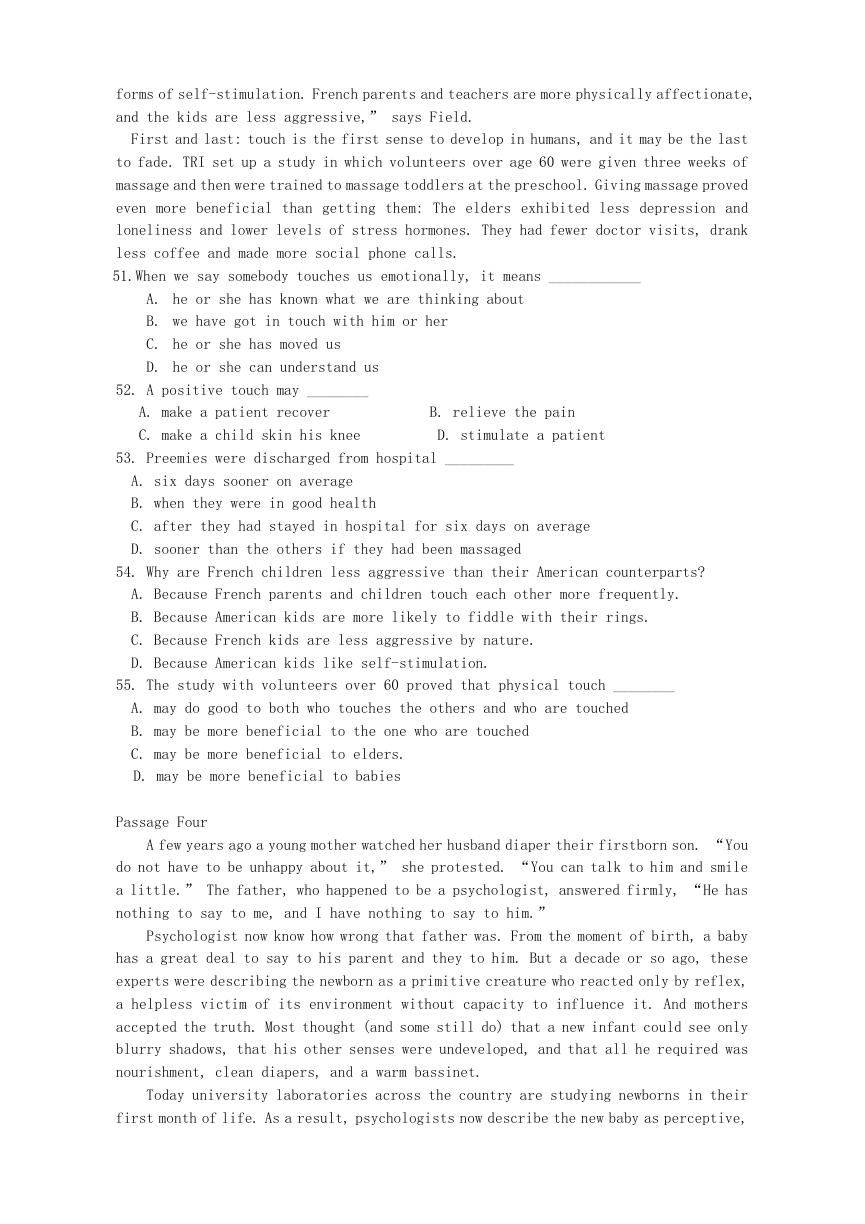
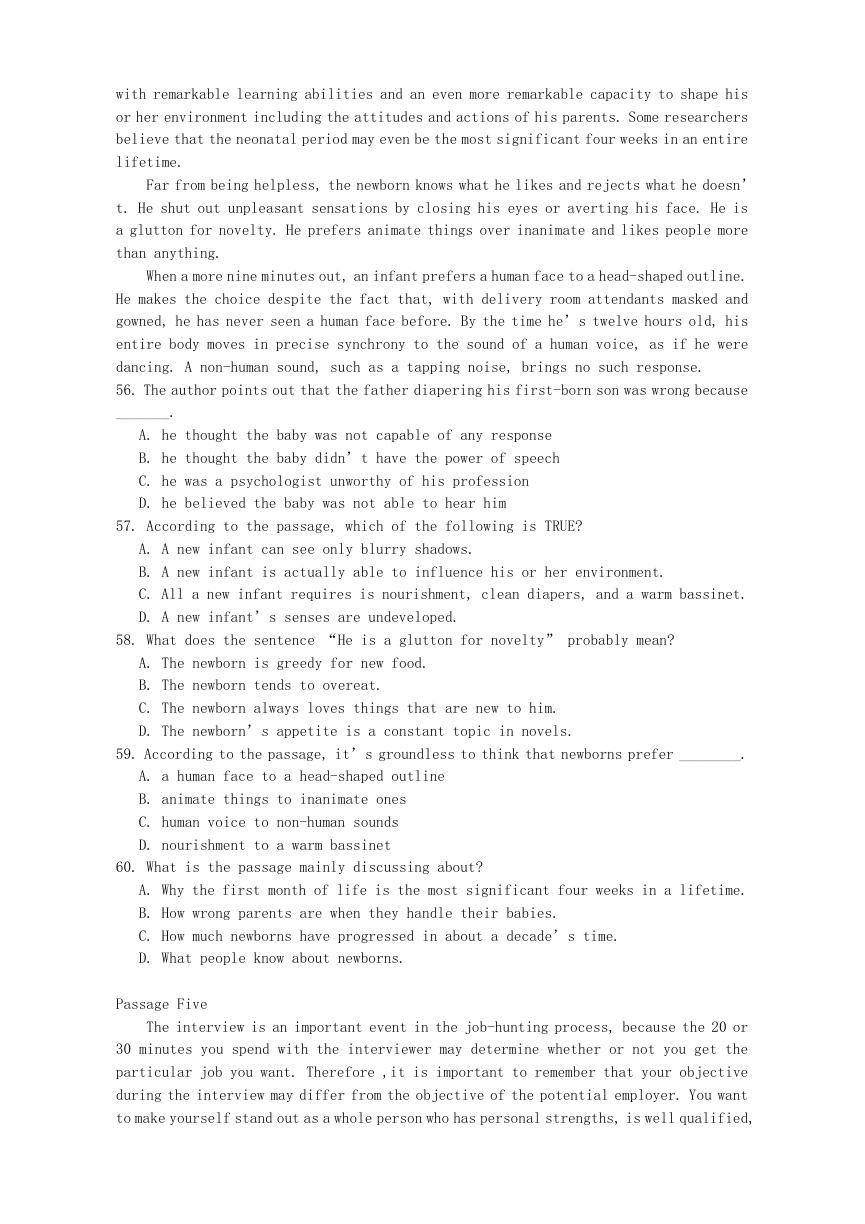
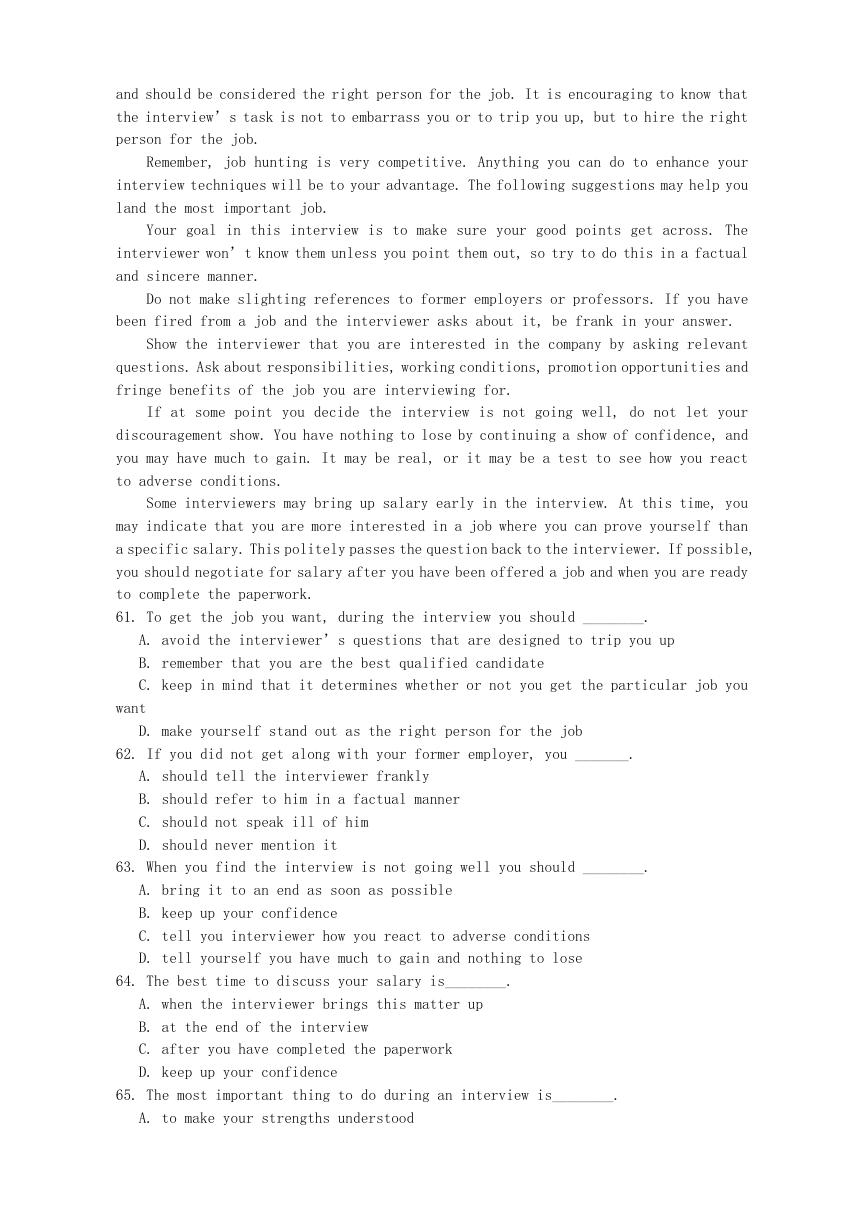








 2023年江西萍乡中考道德与法治真题及答案.doc
2023年江西萍乡中考道德与法治真题及答案.doc 2012年重庆南川中考生物真题及答案.doc
2012年重庆南川中考生物真题及答案.doc 2013年江西师范大学地理学综合及文艺理论基础考研真题.doc
2013年江西师范大学地理学综合及文艺理论基础考研真题.doc 2020年四川甘孜小升初语文真题及答案I卷.doc
2020年四川甘孜小升初语文真题及答案I卷.doc 2020年注册岩土工程师专业基础考试真题及答案.doc
2020年注册岩土工程师专业基础考试真题及答案.doc 2023-2024学年福建省厦门市九年级上学期数学月考试题及答案.doc
2023-2024学年福建省厦门市九年级上学期数学月考试题及答案.doc 2021-2022学年辽宁省沈阳市大东区九年级上学期语文期末试题及答案.doc
2021-2022学年辽宁省沈阳市大东区九年级上学期语文期末试题及答案.doc 2022-2023学年北京东城区初三第一学期物理期末试卷及答案.doc
2022-2023学年北京东城区初三第一学期物理期末试卷及答案.doc 2018上半年江西教师资格初中地理学科知识与教学能力真题及答案.doc
2018上半年江西教师资格初中地理学科知识与教学能力真题及答案.doc 2012年河北国家公务员申论考试真题及答案-省级.doc
2012年河北国家公务员申论考试真题及答案-省级.doc 2020-2021学年江苏省扬州市江都区邵樊片九年级上学期数学第一次质量检测试题及答案.doc
2020-2021学年江苏省扬州市江都区邵樊片九年级上学期数学第一次质量检测试题及答案.doc 2022下半年黑龙江教师资格证中学综合素质真题及答案.doc
2022下半年黑龙江教师资格证中学综合素质真题及答案.doc